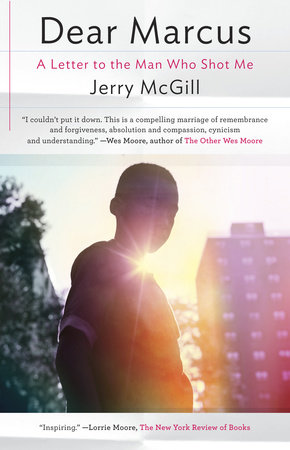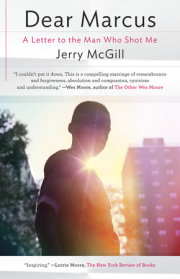OneThe idea to write to you was not an easy one, but I could no longer ignore the calling. It came swiftly and unexpectedly, like a thunderstorm on a humid afternoon or a tumor returned with a renewed ferocity. You can't keep a strong force down. The question becomes, why write to you now, some thirty years after the fact? Why bother to waste this precious blood, sweat, and energy on you—someone I never even met? Someone whom I can only imagine, but never truly visualize or come to understand? Why put any effort at all into contacting someone who came ever so close to ending my life with just the twitch of a finger? It's a valid question whose response is not very easy to articulate. But I suppose I have to try.
The scar from where the bullet entered my back is still there. It always will be, like a tattoo or stretch marks. I honestly never think about it now, as it is out of my sight line, but every so often it rises from the obscurity of my skin. At times a lover will be running her fingers down my neck in a caring, intimate manner and her finger will catch on that point. It feels like a zit now, no larger than a bee sting really. Still, the question always comes: "What's this from?"
The veracity of my answer will always depend on my feelings for the questioner. If I believe she will be around for a while, if she is someone whom I care enough about to share this darkness with, I will give just a little, but only so much.
"Oh, I was involved in an incident a while back," I'll say. You can't reveal too much too soon, you know. There's gotta be some mystery.
If it is someone I just leaned on for comfort at a particular moment, or someone I can tell is not truly "share-worthy," well, then she will receive the casual, harmless white lie. There will be no follow?up response. Not even eye contact. "Oh, that's nothing. Childish roughhousing," I will ramble off as if swatting away a fly. The majority have received the latter. I don't really like to share. It's not in my nature anymore. The events that occurred to produce that scar are not really a place I care to visit. As the saying goes, I have moved on. And I'm proud to make that statement. But now—in this moment in time—addressing It, addressing You, just feels appropriate. Until I speak to you, I can never fully close this door. And I need that resolution. I think I've earned it.
You—my nameless, faceless friend with whom I share such a close, personal relationship—do you ever think about me? Do you ever wonder what became of me—that kid whom you saw walking down the street that one brisk night in January? Was it your intention to link us indelibly with your simple, somewhat effortless act of violence? Were you even remotely aware of the potency of such an act? Did you blink? Give it a second thought? Did you say to yourself, Maybe I shouldn't do this?
I have created over a hundred scenarios for how we "met." With all my time in the hospital there was nothing to do but obsess. It was fascinating at first, putting together those shards of a jigsaw that would forever lack pieces. In my mind you are either black or Latino. Why? Simple deduction, since those are the only types of people who lived in that area where we grew up. I'm going to go ahead and make you black. I have the power now. You are positively a male since women don't typically go about ghettos shooting guns to prove their worthiness. Women don't really grow up with thuggish gun fantasies, do they? They sure as hell didn't back in 1982.
Maybe your name is Leroy. Or Tito. Or Dante. Or Hector. Or Tyrone. Or Javier. Or Jamal. Or Luis. For my own purposes, I have decided to give you a name. It helps me, you see, to give you a human character. You and I, we have such a poignant story and without a name for you the story is too difficult to convey. I am going to call you Marcus. Why Marcus? I don't know. That name speaks to me for reasons not fully apparent, and I believe in going with my first instinct. It fits. It just feels right. And so Marcus it is. Now tell me, Marcus, do you ever ask yourself, What the f*** ever happened to that little dude that I shot in the back that one New Year's night? Did he die or what? Or maybe I just grazed him?
We both know you didn't just graze me, because an ambulance came and we both know that an ambulance don't come to the hood unless something serious is going down. Perhaps you were watching as they took me away on a stretcher—sirens blaring, lights flashing, the whole deal. If you tried to follow up with me in the newspapers the next day you were out of luck, bro, because the shooting of a thirteen-year-old black kid on the Lower East Side? That doesn't make the newspaper in a city like New York.
Since our "meeting" I have lived in cities so tiny, so rural, that this type of event would have been the lead segment on the nightly news. But not here in New York. What with Sons of Sam, Bernard Goetzes, Mafia rubouts, and the occasional bludgeoning. Now if I had been a Kennedy or a Rockefeller or even a Cosby, well that's a whole other story. But no, I was just little Jerome. I didn't warrant so much as a byline.
So I'm just curious, always have been—why did you pick me, Marcus? You may recall that there were two of us walking that night. There was me and there was my best buddy, Eric. Same age, same height, same color. Did the fact that I was wearing a bright blue and silver Dallas Cowboys jacket have anything to do with it? Probably not. Were you high? Drunk? Strung out on crack? Were you and a friend screwing around taking pot shots out of your bedroom or living room window like me and Kahlil used to do with his BB gun, aiming at the pigeons on the roof across the street? Was I your pigeon?
Maybe you never really intended to shoot me? Maybe you meant to shoot near me and just scare us, not actually hit either of us. But hey, shit happens, right? Maybe you wrongly thought I was an old friend or an enemy: local drug dealer who recently dissed you. A guy you heard slept with your woman?
I have created so many scenarios in my head it is incredible. It's a wonderful gift having a creative mind. But sometimes it can be a curse as well. I have the powerful ability to fill in all the crevices and blank spots that you left behind. I get to touch up the masterful painting that you left undone so long ago. I am van Gogh and Matisse, Baldwin and Salinger, Dylan and Lennon. I will make my own reality and place you where I choose. This is my talent. My super power.
In my thoroughness I have conceived of just about every possibility. Like the one that you, Marcus, are no longer even around anymore to read this. That perhaps, once you shot me and left me to die on that cold, hard pavement on Seventh Street and Avenue C, maybe something equally traumatic happened to you shortly thereafter. Maybe you went out to rob a grocery store and you were stabbed by the clerk behind the counter; left to die on a cold, uncaring checkered floor. Or maybe you were riding your bike that afternoon and you were hit by a taxi. Left to die in midtown traffic amid a crowd of hot dog vendors and tourists. Maybe you were busted later that week selling crack, went to Rikers, and got killed in the shower. Or in a prison riot. Or in the laundry room. Hey, maybe, just maybe, you were so riddled by guilt at realizing that you shot a helpless kid that you delved into a life of substance abuse and OD'd on heroin one cool February night. Left to die in a bathtub. Or you took a header off the roof of your building, not too far from where you shot me. Or you hung yourself in the broom closet of your day job as a junior high school janitor. I've thought of it all, over and over. It used to be all that I could do: come up with ways Marcus could die. Should die.
Truth be told, it doesn't really matter much because I didn't write this book for you, Marcus. My reasons for writing this are bigger than you or me, my friend. I wrote this book to release demons into the warm night air. I wrote this book to leave some scant history, a trail of breadcrumbs, for the children I will never have and the children that you probably have had. I wrote this book so that someone else might understand us. I wrote this book for any great number of people who believe that Life really gave them the short and shitty end of the stick. I wrote this book for all of those unfortunate suckers who were in the proverbial wrong place at the wrong time. Were we chumps or what? Or were we?
Who knows, maybe in our own way we were actually the lucky ones. Wouldn't that be a wondrous piece of irony, huh? Perhaps, by virtue of circumstance and timing, we avoided an even harsher reality. Cormac McCarthy wrote in No Country for Old Men, "You never know what worse luck your bad luck has saved you from." I love this perception. Maybe, just maybe, it was our destiny to be in that so-called wrong place at the wrong time. If that should be the case, then I most likely owe you a debt of gratitude, Marcus old boy. If you're still around, call me. I owe you a beer or two.
But I should reiterate, I didn't write this book for you, Marcus. I wrote this for a certain population of the world: Those who endure. Those who manage. Those who cope. Those who get out of bed every morning and continue to go on with the business of their lives knowing what they know. Those who look into the eye of the storm and step out of it battered, drenched, and unbeaten. Those who are determined to move on. Maybe you're one of us? Now that would truly make for a great story, would it not?
I hope you are one of us, Marcus, because we all deserve a second chance; that shot at redemption. In many ways, we are probably very much alike, you and I. We were both given lemons. What did you do with yours, Marcus? I, for one, chose to make a martini.
Copyright © 2012 by Jerry McGill. All rights reserved. No part of this excerpt may be reproduced or reprinted without permission in writing from the publisher.






